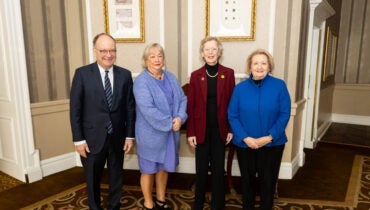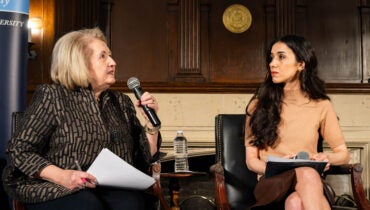The Georgetown Institute for Women, Peace and Security convened Sudanese women peacebuilders in Kampala, Uganda last month to discuss the current crisis, explore lessons learned from the past, and develop recommendations for policymakers.
Civil war in Sudan between the Sudanese Armed Forces (SAF) and Rapid Support Forces (RSF) has wreaked havoc on the civilian population. The conflict has led to the largest internal displacement crisis in the world, forcing nine million people to flee their homes and seek refuge elsewhere in Sudan. Women and girls are especially vulnerable as they have been subjected to conflict-related sexual violence, gender-based violence, sexual slavery, forced marriage, and trafficking. This compounds threats facing all Sudanese citizens–including insecurity, a loss of livelihood, and limited access to basic resources–and creates a dire situation for women and girls.
Throughout the crisis, women have been on the frontlines of humanitarian relief and response efforts and consistently advocated for peace. However, women have been marginalized and kept out of international efforts to negotiate an end to hostilities and other key decision-making opportunities.
This convening brought together a diverse group of leaders from across Sudan with a wealth of experience in humanitarian aid, policy and advocacy, women’s rights, education, and organizing to better understand the crisis in Sudan and explore a way forward that centers women’s leadership in ending the conflict.
“Women’s peace and feminist activists in Sudan’s political spaces are surrounded by challenges and impediments, while our narratives and views are not acknowledged,” said Regional Director of the Strategic Initiative for Women in the Horn of Africa (SIHA) Hala Al-Karib. “It is critical to invent an inviting and supportive space for those of us who have contributions.”
In the face of such adversity, it would be understandable to get trapped in feelings of despair. However, these Sudanese women leaders exemplified the resilience and determination of the Sudanese people to build a better Sudan.
“I was particularly moved by the dedication and resilience demonstrated by the women leaders and activists who are making a tangible difference,” said Dr. Intisar Soghayroun, former Minister for Higher Education in the Transitional Cabinet in Sudan. “Their stories and achievements have filled me with hope and motivation to contribute further to these important causes.”
At the end of the two-day convening, the women developed key recommendations in support of ending the conflict, protecting civilians, including women in decision-making, improving aid delivery, and charting a path toward justice and accountability. They presented these recommendations to the US Special Envoy for Sudan Tom Periello, who is leading U.S. diplomatic efforts to bring an end to the war.
Some of the top recommendations from Sudanese women leaders include:
Inclusive Decision-Making:
- Women must be included in all decision-making, and present directly in negotiations.
- Multilateral, bilateral, and private donors should support the creation of an inclusive civil society women’s advisory group.
- Donors should fund visits with local voices from Sudan to share lived experiences, expertise, and local context updates for governments and multilateral organizations.
Humanitarian Aid:
- Donor nations and organizations must recognize the depth of the crisis and increase support for basic services across Sudan and in neighboring countries where there are refugees.
- Bilateral, multilateral, and private donors must work with local Sudanese organizations that are already providing the bulk of services on the ground.
Civilian Protection & Support:
- The international community must advocate for authorization and establishment of civilian protection forces, under the UN, AU, or a regional coalition of the willing. Civilian protection forces are needed on the ground, with an enhanced mandate for civilian protection.
Accountability:
- The UN Security Council—including the US—and parties to the Rome Statute must support the ICC in implementing the pending arrest warrants related to investigations in Darfur.
- The Office of the United Nations High Commissioner for Human Rights in collaboration with local NGOs must establish a consultative process with victims and their families to inform the accountability mechanisms created during future talks and to promote victim-centeredness throughout any political process.
Read the full list of recommendations here.

